2024 Advent Devotional
A Daily Advent Devotional from Lancaster Bible College
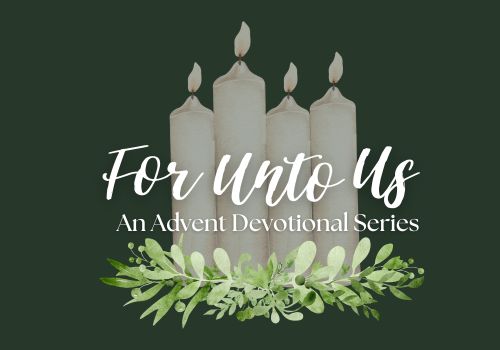
‘For Unto Us a Child Is Born…’
Lancaster Bible College invites you to enjoy, reflect upon, be challenged by and find inspiration in a daily Advent devotional series. Previously written by various LBC faculty and staff, we pray these timeless truths of Christmas are a gift to you this season.
Advent devotionals are posted daily December 1-31, 2024, and released one week at a time each Friday. Please check back regularly to view and share new content. Lancaster Bible College wishes you a blessed Christmas season!
‘For to us a child is born, to us a son is given; and the government shall be upon His shoulder, and His name shall be called Wonderful Counselor, Mighty God, Everlasting Father, Prince of Peace.’ Isaiah 9:6, ESV
Week 1: December 1-7 | Week 2: December 8-14 | Week 3: December 15-21
Week 4: December 22-28 | Conclusion: December 29-31
Week 1 | December 1-7
Dec. 1 | W-O-N-D-E-R-FUL Counselor
 By Dr. Tommy Kiedis, President
By Dr. Tommy Kiedis, President
For to us a child is born, to us a son is given; and the government shall be upon His shoulder, and His name shall be called Wonderful Counselor, Mighty God, Everlasting Father, Prince of Peace.—Isaiah 9:6, ESV
I’m a pretty simple guy. It doesn’t take much to make my head spin. I’m not talking about the star-struck stupor that grips teenagers when they fall under a celebrity’s shadow. I’m thinking more of jaw-dropping wonder that comes with a few more years…
- Marveling that I can buy thousands of hours of someone’s work for a penny on Amazon.
- Contemplating my “moment in time” in the grand scope of the universe.
- Witnessing the birth of our children.
- Delighting in the uniqueness of each of our grandchildren.
When I open my Bible, I’m greeted with more wonder…
- God ripping apart the Red Sea as simply as I shear an old rag.
- God guiding his people—not by Hollywood spotlight—but Heavenly Maglite.
- God bringing tap water for his people by tapping on a rock.
Sometimes I’m at a loss to find words fit for my fascination. Not God. God’s word of choice is W-O-N-D-E-R. It means “marvelous” and conveys the miraculous. As Edward J. Young notes in his commentary, “The Book of Isaiah,” “The word refers to what God has done and not to the works of man.”
This makes sense. When God wanted to express to his people the mind-numbing, heart-thumping, nation-conquering, soul-satisfying nature of the Messiah he used the word “wonder.”
According to Young, the first of four titles attributed to the Messiah in Isaiah 9:6 is literally, “Wonder Counselor.” Yes, the Messiah is wonderful, but as His title rightly ascribes, He is Himself a Wonder—a Wonder through and through. At times, I think we miss that as we celebrate “the baby” in the manger. This is no “baby…”
- He is God with skin on.
- He is the Creator in the cradle.
- He is King of kings and Lord of lords lying “helpless” so he can help us.
This child is a wonder!
PRAY & REFLECT: “Lord Jesus, forgive me for making you small. I praise you that you are the Wonderful Counselor, so superior in every way, yet so present and so real today.”
Dec. 2 | Comfort Ye
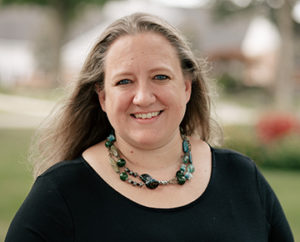 By Rachel Sidebothom (’02), MME, Interim Chair of the Music, Worship & Performing Arts Department
By Rachel Sidebothom (’02), MME, Interim Chair of the Music, Worship & Performing Arts Department
Comfort ye, comfort ye my people, saith your God. Speak ye comfortably to Jerusalem, and cry unto her, that her warfare is accomplished, that her iniquity is pardoned: for she hath received of the Lord’s hand double for all her sins. The voice of him that crieth in the wilderness, ‘Prepare ye the way of the Lord, make straight in the desert a highway for our God.’—Isaiah 40:1-3, KJV
As a musician, specifically as an oboist, I am often called upon to play for George Fredrich Handel’s “Messiah” during the Christmas season. This oratorio, composed by Handel in 1741 (setting the libretto by Charles Jennens), is one of the few works in our canon of Western music that speaks truth directly from Scripture and tells of the complete work of Christ!
The first part centers on Old Testament prophecies of the coming of the Savior and presents Christ’s birth, while the second and third parts portray the passion, death and resurrection of our Savior, and the coming judgment day of Christ, giving hope to those who are found in Him. The text for Messiah is straight from God’s Word. You might be most familiar with “Hallelujah” or “Worthy is the Lamb,” two of the glorious pieces in this oratorio which lead us in profound and joyful worship of our Lord and Savior, Jesus Christ.
But one of my favorite moments of the “Messiah” is in contrast to those powerful, stirring pieces and arrives soon after we play the “Sinfony” or Overture. The first words sung in this masterful work are “comfort ye.” Have you ever considered the power in this simple truth that sets up the rest of the gospel presented in this work?
What a hope-giving and joy-filled peace these truths give us! Our war with sin has already been won! Our iniquity is pardoned! And, as Isaiah continues in Chapter 40 and Handel presents in the “Messiah,” the glory of our God will be revealed! I find my soul resting and settling as I listen to those resounding truths sung by a powerful voice each time I perform Handel’s “Messiah.” God is speaking comfort and hope to each of us in this Advent season. In the hustle and bustle, rest in His finished work on our behalf.
PRAY & REFLECT: “Father in Heaven, thank you for the promise of your comfort in the promise of Jesus as our Messiah. His coming then, and the promise of His return, comfort my heart. Help me to rest in that when the days of stress or turmoil bring havoc to my soul. Amen.”
Dec. 3 | It is Well with My Soul
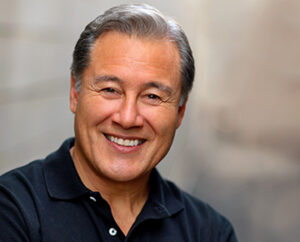 By Dr. Wayne Cordeiro (’17), Master of Arts in Formational Leadership Lead Mentor
By Dr. Wayne Cordeiro (’17), Master of Arts in Formational Leadership Lead Mentor
Preparing our soul for Advent is extremely important since the Christmas holidays are filled not only with the “joy” of Christmas but also with the “junk” of Christmas. The Advent season is crammed with clutter, noise, anxiety and the chaos that pulls us away from our faith center of the coming of Christ as Emmanuel—God with us.
The word “advent” transliterated from the Greek means the “coming” or “arrival.” The Advent season is a time for us to focus our attention toward the coming of Jesus as Messiah, Christ and King. It is also a time for us to prepare our “soul” for the arrival of Jesus this Christmas.
All goes well with us when we are focused on the health of our souls. 3 John 2 says:
Dear friend, I pray that you may enjoy good health and that all may go well with you, even your soul is getting along well (NIV).
The state of our soul profoundly affects the way we live. It affects the way we think, the way we act and what we believe. If we are not growing our soul, the result is that, inevitably, we get adept at only going through the motions of Christianity, Christmas and the Advent season.
One important healthy practice of soul care is doing daily devotions—reading the Word and praying. Our soul has to be of such importance that it warrants our investment of time. When I go to my small group Bible study, I go because it is healthy for my soul. Even after a full day in the office, when my flesh says, “I would rather go Christmas shopping than to go to my small group because that would be fun,” I say to myself, “No, I won’t think that way!”
It is healthy for my soul to hear the Word of God and be with brothers and sisters who will hold me accountable. No daily habit is more important than maintaining a healthy soul, especially when we are preparing for the arrival of the Emmanuel. Then when He arrives and asks, “How’s your soul, Wayne?” I can sing, “It is well, with my soul. It is well, it is well, with my soul.”
PRAY & REFLECT: “Lord, help me to identify the deception that is so prevalent in our world today. Keep me from running ahead of your plan for me and for this day. Help me to walk in love and obedience hearing your voice. Amen.”
Dec. 4 | Rejoicing as Mary Rejoiced
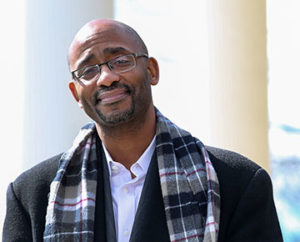 By John Churchville, JD, Criminal Justice Program Director
By John Churchville, JD, Criminal Justice Program Director
And Mary said,
‘My soul magnifies the Lord,
and my spirit rejoices in God my Savior,
for he has looked on the humble estate of his servant.
For behold, from now on all generations will call me blessed;
for he who is mighty has done great things for me,
and holy is his name.
And his mercy is for those who fear him
from generation to generation.
He has shown strength with his arm;
he has scattered the proud in the thoughts of their hearts;
he has brought down the mighty from their thrones
and exalted those of humble estate;
he has filled the hungry with good things,
and the rich he has sent away empty.’
—Luke 1:46-53, ESV
It was nine months or so before the first Christmas, and Mary is already rejoicing with family! No gifts yet, nothing fancy, simply two women rejoicing that God has seen fit to notice them, out of all the other women in the world, and to use them spectacularly for His greater plan. What must that have been like in a culture and society where many women were not honored, or educated, or regularly thought of for spectacular plans? God noticed one who was past child-bearing years (Luke 1:7, 18) and one who had never been with a man (Luke 1:34). What kind of a God is this, this counter-cultural God, who notices those often not honored in larger society, in a small country that was insignificant in the eyes of the larger world?
Mary is rejoicing for several reasons:
- God has regarded her lowly state… God has done great things for her…
- God is holy and merciful… God scatters the proud, puts down the mighty and exalts the lowly…
- God fills the hungry with good things and sends the rich away empty…
When is it that I am most likely to rejoice—on Christmas day or long before? Can I rejoice in spite of gifts given or not received, of money in surplus or in need, of health that is excellent or poor, of family that is strong and close or weakened and far away, simply because of the truth of God’s unchanging nature? Has there ever been a holiday season where I felt empty? What can I pray this season in order to be as full of rejoicing as Mary?
PRAY & REFLECT: “Dear Lord, I am humbled to be loved by you and blessed by you, an unchanging God. Accept my gratitude and deep thanks for these blessings. Show me how to bless others with that same love. Amen.”
Dec. 5 | What Gifts Can We Bring?
 By Mary Yager, MSW, Assistant Professor of Social Work
By Mary Yager, MSW, Assistant Professor of Social Work
And going into the house, they saw the child with Mary, his mother, and they fell down and worshiped Him. Then, opening their treasures, they offered Him gifts, gold and frankincense and myrrh.—Matthew 2:11, ESV
What wonderful gifts were presented to the baby Jesus; costly gifts fit for a King! The Magi’s gifts of gold, incense and myrrh are believed to be the origin of our modern gift giving tradition and ought to inspire us this Advent season.
At Christmastime, we put great love and effort into the perfect gifts for our family and friends. What joy it brings us to show our love to those who we value most in our lives.
But what gift can we give to our King? What is the perfect gift for the baby Jesus?
When I was quite a young child, I remember asking my father what he would like for Christmas. His answer was “Hugs and kisses!” He didn’t need another silver Cross pen set or a new necktie; he wanted the love of his child. But that answer did not satisfy me. I wanted to give my father a physical gift to show him how much I loved him. I wanted to wrap it up and put it under the tree.
What does Jesus want this Advent season? He wants our love. We can love Him completely with our hearts, soul, mind and strength. But we can also put our love into action with tangible gifts—gifts that we can wrap and put under the tree. Jesus told us in Matthew 25:34-40 that whatever we do for the least of His children, we do for Him. When we care for the poor, clothe the naked and give food to the hungry, we are giving gifts to the newborn King. Baby Jesus is all around us! We can lay gifts of gold, incense and myrrh at His feet. Where will you find Jesus this Advent season? He is eager to receive your gift.
PRAY & REFLECT: “Dear Heavenly Father, thank you for giving me the gift of your son, Jesus. Thank you for the gift of salvation. Please open my eyes and my heart, Lord. Bring before me the opportunity to bless others with gifts fit for a King. Help me embrace the knowledge that what I do for the least of your children, I am doing for you. Amen.”
Dec. 6 | Make Room for the King
 By Rev. Zachary Ritvalsky, Director of Strategic Projects
By Rev. Zachary Ritvalsky, Director of Strategic Projects
And she gave birth to her firstborn son and wrapped him in swaddling cloths and laid him in a manger, because there was no place for them in the inn.—Luke 2:7, ESV
I have become extremely conscious of the homeless I encounter in the City of Philadelphia. It appears no convenience store or intersection is immune from their presence along the routes I travel. There are males and females from all generations representing African Americans, Euro-Americans and Latin Americans whose faces have become indelibly etched on my mind. They hold signs with Crayon-formed letters intended to bring attention to their plight. Most signs open with, “I’m homeless” and end with “God bless you” whether you contribute, or not, to their cause. I’ve never in my years of active observation seen homelessness so pervasive in the City of Brotherly love.
While reflecting on this social dilemma, in the comfort of my home, I was drawn to think about Luke 2:7, where the writer points out that the Savior of the world was born into a similar situation. Due to a census that had been commissioned and the need for people to report to their birthplace, Jesus’ mother was forced to deliver the King of Kings and Lord of Lords in a manger because, in the words of Luke, “…there was no place for them in the inn.”
What a travesty, what a shame, and yet a reality of life on this side of heaven embraced by the Redeemer as part of His identification with humanity. As we engage this season of Advent, let’s be mindful to make room in our hearts, our heads and our homes for the King.
PRAY & REFLECT: “Eternal God, I thank you for the gift of your Son, Jesus Christ. I marvel in you taking on human flesh and willingly subjecting yourself to a hostile world in order that a remnant would be saved. But what better way to become the world’s Savior? Truly your thoughts are not our thoughts and your ways not our ways. Therefore, I pray you conform our thinking to be in alignment with your thoughts as we engage this season of Advent and celebrate the arrival of your Son into the world. Amen.”
Dec. 7 | It’s the Gift That Counts
 By Scott Keating, MA, Vice President of Advancement
By Scott Keating, MA, Vice President of Advancement
For God so loved the world that He gave His one and only Son, that whoever believes in Him shall not perish but have eternal life.—John 3:16, NIV
Really! Is it that simple? All you have to do is think about giving a gift and that’s enough? Somehow as we approach Christmas, the quintessential gift-giving day, I think there might actually be more to it than that.
Gary Chapman, in his book “The Five Love Languages,” identifies one of those love languages as receiving gifts. That is my language. I love to receive gifts. Small or large, practical or impractical, it doesn’t matter. For me, it’s all about the gift. I know that may sound a little childish for someone my age, but that is just the way I am wired. I can’t imagine how I would feel Christmas morning if the family gathered around the Christmas tree, ready to begin the exchanging of gifts, and there were none for me.
“I thought about getting you a gift, Dad.”
“Honey, I can’t tell you how many times I thought about buying you a gift this Christmas, but I just never got around to it.”
“The thought was enough, right?”
Hardly! Intentions are nice, but it is the gift that really counts.
Over 2,000 years ago, our Heavenly Father did more than just think about us. He sent His one and only Son, the most precious and perfect gift He knew, to be born and ultimately die on a cruel cross, so that we might have the opportunity to spend eternity with Him. Can you even begin to think what might have been if all He had done was to think about us? I, for one, am so glad He not only gave but that I received. What about you?
PRAY & REFLECT: “Father, thank you that you not only thought about me but that you also acted by giving your Son so I might spend eternity with you. Help me this Advent season to not just think about others but to give out of the abundance you have given to me. Amen.”
Week 2 | December 8-14
Dec. 8 | Enveloped in Peace
 By Dr. Mark Meyer (’93), Director of the PhD in Biblical Studies
By Dr. Mark Meyer (’93), Director of the PhD in Biblical Studies
Now may the God of peace himself sanctify you completely, and may your whole spirit and soul and body be kept blameless at the coming of our Lord Jesus Christ.—1 Thessalonians 5:23
If you were asked to capture the essence of Christmas in a word, what would it be? If I were asked to summarize the very essence of Christmas in a single word, I would say, “Peace!” In fact, if I were asked to summarize the message of the entire Bible in a single word, it would be “Peace!”
Seven-hundred years before the incarnation, the greatest prophet of all wrote:
For to us a child is born, to us a son is given; and the government shall be upon His shoulder, and His name shall be called Wonderful Counselor, Mighty God, Everlasting Father, Prince of Peace.—Isaiah 9:6, ESV.
The fourth climactic title ascribed to the God-man, Jesus, is “Prince of Peace.” In Hebrew, this name is Sar Shalom. The birth of Jesus makes peace with God, peace within ourselves and peace with each other possible. The Hebrew idea of shalom is “integral wholeness.” That wholeness extends to our spirit, soul and body.
Because the Prince of Peace would die on the cross as our substitute, God reminds us that, “We have peace with God through our Lord Jesus Christ” (Romans 5:1, ESV). The sin that separates a person from a perfect God can be obliterated through faith in Jesus! Jesus was born to bring that peace and to be the Head of the Church, which should be characterized by peace. He reigns over us in Peace!
The angels in heaven proclaimed the essence of Christmas when they praised God and said, “Glory to God in the highest, and on earth peace among those with whom he is pleased” (Luke 2:14, ESV)! The good news is this: because Jesus has come, we can have peace with God, within ourselves and with each other.
May you, this Christmas, experience the realization of the priestly blessing because of our Great High Priest, Jesus: “May the Lord envelope you in His peace” (Numbers 6:26).
PRAY & REFLECT: “My dear Heavenly Father, thank you for sending the Prince of Peace, Jesus! I place all my worries into your loving hands. Envelope my spirit, soul and body with your shalom. Use me to be a peacemaker. May I be an instrument of peace, like Jesus. Amen.”
Dec. 9 | A Message from Christmas Lights
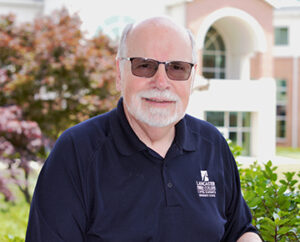 By Rev. Robert Reid, Ambassador & Student Caregiver
By Rev. Robert Reid, Ambassador & Student Caregiver
You are the light of the world. A city set on a hill cannot be hidden. Nor do people light a lamp and put it under a basket, but on a stand, and it gives light to all in the house. In the same way, let your light shine before others, so that they may see your good works and give glory to your Father who is in heaven.—Matthew 5:14-16, ESV
When December nears, Christmas lights poke holes of light into the dark night of approaching winter. Their glow seems to announce that the bleakness of winter is not going to win. Light piercing the darkness somehow deflates the gloom often associated with shorter days and longer nights of winter. They portend that from dark nights there will again emerge days to again enjoy the sun-drenched days of spring. One might say the Christmas lights both illuminate our vision and brighten our spirits.
Jesus Christ identified Himself as the “light of the world” (John 8:12). In addition to using light as a description of Himself, He added how people in a dark world reacted. He said, “The Light has come into the world, but men loved darkness more than light, because their deeds were evil” (John 3:19). Perhaps we have all experienced being in a darkened room and suddenly a bright light is lit. The reaction is to shield our eyes from the light’s brightness. Jesus used light to both define Himself and describe the reaction He would receive because of who He is.
Christmas lights also remind us of who we are to be as followers of Jesus. Jesus called His followers “the light of the world.” Who Jesus is, “the light of the world,” is to be what His followers are to reflect.
The very life that Jesus lived on planet Earth supported the claims of who he said he was. He engaged in displaying the light of His love by works of grace and mercy. His followers also did this, and this resulted in them turning the world upside down (Acts 17:6). Light makes a difference. It is hard to overlook light in a dark place.
Our world right now seems to be in a dark place. It needs people who are committed to reflecting the character of Jesus. Reflect love not hatred, peace not turmoil, hope not despair, joy not anger, compassion not indifference, sacrifice not selfishness, benevolence not bickering. Let Christmas lights remind us not only whose birth we celebrate but also how we are to live.
PRAY & REFLECT: “Dear Jesus, may we be reminded as we see the lights of Christmas that you loved us so much that you came into our darkness so we could ‘have the light of life.’ May we in turn reflect your light to our world in darkness so many may accept God’s great gift of salvation through faith in Jesus Christ, the Light of the world. Amen.”
Dec. 10 | First Advent, Second Advent
 By Dr. Krissi Castor (’13), Chair of the Arts & Sciences Department
By Dr. Krissi Castor (’13), Chair of the Arts & Sciences Department
Jesus Christ’s first advent shattered the 400 years of silence that had shrouded the prophecies concerning Israel’s promised deliverer. Where was God in this dark age of sorrow, oppression and captivity? When would He make good on His promises?
Galatians 4:4-5 states:
But when the fullness of time had come, God sent forth his Son, born of woman, born under the law, to redeem those who were under the law, so that we might receive adoption as sons. (ESV)
Jesus Christ turned the page by piercing the silence and ushering in the new day. God had not forgotten; Christ had not arrived on the human scene too early or too late. When He wrote Himself into the saga of human tragedy, He fulfilled the Father’s words perfectly (2 Peter 1:19-21). However, the story does not end at the nativity. Hebrews 9:28 assures us that “Christ, having been offered once to bear the sins of many, will appear a second time, not to deal with sin but to save those who are eagerly waiting for Him” (ESV).
Christ’s birth fulfills past prophecies and foreshadows the future complete restoration for those who belong to Him and eagerly anticipate His coming. A look back to the manger points us to the cross, into the empty tomb and, ultimately, to the clouds (Revelation 1:7). He has not been silent. He has not been absent. He keeps His promises. With all the authority of heaven, Christ proclaims, “Surely, I am coming soon,” and we declare, “Come, Lord Jesus!” (Revelation 22:20).
PRAY & REFLECT: “Dear Lord, as we celebrate Your birth and look back at the manger, may we also be eagerly looking forward to your return. Come, Lord Jesus. Amen.”
Dec. 11 | All is Calm, All is Bright
 By Deborah Hunt (’78), MLS, Head of Collection Department, Charles & Gloria Jones Library
By Deborah Hunt (’78), MLS, Head of Collection Department, Charles & Gloria Jones Library
And they went with haste and found Mary and Joseph, and the baby lying in a manger. And when they saw it, they made known the saying that had been told them concerning this child. And all who heard it wondered at what the shepherds told them. But Mary treasured up all these things, pondering them in her heart. And the shepherds returned, glorifying and praising God for all they had heard and seen, as it had been told them.—Luke 2:16-20, ESV
I love to contemplate the birth of the Savior. I also love the carols of Christmas. When I picture the shepherds, I think of the words of the carol “Silent Night” (words by Josef Mohr):
Silent night, holy night, all is calm, all is bright
Round yon Virgin Mother and Child, Holy Infant so tender and mild
Sleep in heavenly peace, sleep in heavenly peace
I picture the shepherds arriving at the stable. Perhaps they are still shaken by their encounter with the multitude of the heavenly host. Then they step into the haven of calm brightness that surrounds the baby in the manger. As they look, there is no thought of hurry or worry. They are at rest in the presence of their Lord and Savior.
Here are some ways to bring a calm brightness into the busy celebration of the birth of Jesus Christ:
- Read the story of the birth of Jesus from Luke 2 as you set up your nativity scene. Talk about the part each participant played.
- Place ornaments on your tree that represent the names of Jesus. Select one ornament per day, read the verse where the name is found and discuss its meaning. Lamb of God—hang a picture of a lamb(John 1:29); Good Shepherd—hang a pipe cleaner staff (John 10:11); Bread of Life—hang a picture of a loaf of bread (John 6:35); King of Kings—hang a picture of a crown (Revelation 17:14); Light of the World—hang a picture of a light or the earth (John 8:12), etc.
- Help someone else. Ask the Lord to show you how to serve: make a donation, volunteer with an organization or participate in a local toy or food drive.
PRAY & REFLECT: “Dear Heavenly Father, thank you for the marvelous gift of your Son. Help me to discover calm havens in my heart in the midst of this busy season. Help me to look for meaningful ways to celebrate the brightness of the gift of my Savior. Amen.”
Dec. 12 | Never Settle for a Knockoff
 By Dr. Kevin Gushiken, Dean of the School of Bible & Ministry, Director of the PhD in Leadership and DMin programs
By Dr. Kevin Gushiken, Dean of the School of Bible & Ministry, Director of the PhD in Leadership and DMin programs
Behold, the virgin shall conceive and bear a son, and they shall call his name Immanuel (which means, God with us).—Matthew 1:23, ESV
One Christmas, my daughter indicated she would love some winter boots. The boots she wanted were brown with fur lining on the inside. She was interested in something like the popular UGG boots. Knowing that his sister really wanted some boots, my son bought a pair for her that were inexpensive, in his price range, that looked like UGG boots. They look great. They seemed to be well-constructed. They were perfect. She loved them.
The only problem is that they did not hold up. They started to break down immediately. I called the company to explain the problem. Graciously, they sent out another pair. Yet, as you can guess, this pair also began to break down. So, I learned my lesson: do not buy a knockoff.
Christmas reminds me of this struggle. It lends itself to a lot of knockoffs. On Christmas morning, we open up the box. We get that perfect present. Yet, after a few months, the joy wears off and the gift becomes simply another item we own. Or we can’t wait to get some time off. Life is busy. Work is stressful. You long to wake up at 8 instead of 5:30. Joy—until you get that email reminding you of some family issue that is frustrating you. Knockoffs are fleeting, yet we chase after them.
God shows himself to us in Christ. God is present with us in Christ. Christ is the only truly satisfying pursuit. All that is good and perfect can be found only in the person of Christ. What we receive in Jesus is not a knockoff but a legitimate, transforming joy from the one who created it, God. This Christmas pursue that which is true, perfect and lasting—Christ Jesus.
PRAY & REFLECT: “Father, we confess that often we replace you with knock-offs and regret that deeply. Forgive our lack of discernment, and restore our hearts with the joy that comes with knowing Jesus. Fill my heart with that true and lasting joy. Amen.”
Dec. 13 | Mary’s Waiting
 By Dr. Julia Hershey (’98), Associate Provost for Academics
By Dr. Julia Hershey (’98), Associate Provost for Academics
And behold, you will conceive in your womb and bear a son, and you shall call his name Jesus. He will be great and will be called the Son of the Most High. And the Lord God will give to him the throne of his father David, and he will reign over the house of Jacob forever, and of his kingdom there will be no end.—Luke 1:31-33, ESV
The Christmas story is full of waiting. Perhaps we miss the passage of time because we celebrate Christ’s birth on one designated holiday or display the nativity figures in one scene. We can read the events in our Bibles in a short amount of time, but the events actually took place over many months, at least nine for Mary until the birth of Christ. Waiting can be hard, a time of doubt and darkness while clinging to hope and promise.
Mary had the most obvious and intimate wait. Her ever-growing belly was an obvious and constant reminder to her and all around of the promise given by the angel in Luke Chapter 1. Even though an inexplicable joy awaited her, she had to wait. Nine months to see the birth of her son. A lifetime to see Him again. An eternity to join in His reign. Through her waiting she praised God for His mighty acts and mercy (Luke 1:54).
Mary’s waiting was also very intimate. Imagine having the One who formed you forming and weaving together in your body. Carrying a child provides a unique bond between mother and child; yet Mary’s relationship with her child went even deeper as she experienced the relationship of Creator and created, Savior and sinner, Father and daughter. Her wait provided opportunity for the development of a close, intimate relationship.
This Christmas season, you may find yourself in a season of waiting. Mary provides a picture of waiting—praising even in the midst of extraordinary circumstances and deepening her relationship with her Savior. May we be people who wait with confidence in and connection to the One who holds all time.
PRAY & REFLECT: “Dear Lord, may we use the seasons of waiting that you bring to our lives as times to praise you and as times to deepen our relationship with you. Help us to grow while we wait. Amen.”
Dec. 14 | Loyalty to the King
 By Dr. Daniel E. Carver (’10 & ’15), Associate Professor, Old Testament in Bible & Theology
By Dr. Daniel E. Carver (’10 & ’15), Associate Professor, Old Testament in Bible & Theology
You shall love the Lord your God with all your heart and with all your soul and with all your might.—Deuteronomy 6:5, ESV
The Christmas season invites us to step away from the busyness we live in and reflect on who we are and what we prioritize with our time and resources. But, most of all, the celebration of the birth of our King, Jesus Christ, invites us to renew our loyalty to Him.
Jesus taught how important loyalty to God is when He quoted Deuteronomy 6:5, saying that the greatest commandment was to “love the Lord your God with your whole heart, and with your whole soul, and with your whole mind” (Matthew 22:37). We often think of “love” as something emotional and of “heart” as the seat of emotions. But throughout the Old Testament the word translated “love” in Deuteronomy 6:5 refers more to loyalty than to emotions, and the “heart” was the seat of cognition. In other words, the greatest commandment might be paraphrased this way: “Be loyal to the Lord your God with everything you are and everything you’ve got!”
One of my favorite Christmas songs, “O Tannenbaum,” describes how the needleleaf tree inspires us with its loyalty. It begins “O Tannenbaum, wie treu sind deine Blätter!” (“O Christmas tree, how faithful are your leaves!”). Its leaves are loyal; they stay on all year long. Even in winter when every broadleaf trees’ leaves have fallen, the needle leaves remain faithful.
This Christmas, when we see a needleleaf tree, with its faithful leaves, let us remember that this season is about our king, Jesus Christ, and our loyalty to Him.
PRAY & REFLECT: “Father, whenever I look at an evergreen tree during this Christmas season—whether decorated and in a home or out in creation—remind me to be loyal to you with everything I am and everything I have. I love the imagery of the faithfulness of evergreen needles. Help me to be ever more faithful to my King. Amen.”
Week 3 | December 15-21
Dec. 15 | He’s Just a Baby, Isn’t He?
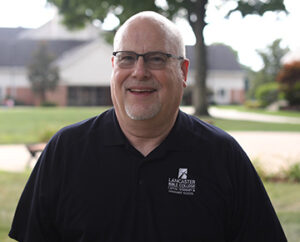 By Rev. Daniel A. White, Student Caregiver & Pastor at Large
By Rev. Daniel A. White, Student Caregiver & Pastor at Large
Long ago, at many times and in many ways, God spoke to our fathers by the prophets, but in these last days he has spoken to us by his Son, whom he appointed the heir of all things, through whom also he created the world. He is the radiance of the glory of God and the exact imprint of his nature, and he upholds the universe by the word of his power. After making purification for sins, he sat down at the right hand of the Majesty on high, having become as much superior to angels as the name he has inherited is more excellent than theirs.—Hebrews 1:1-4, ESV
The belief of many today as they contemplate Jesus at Christmas is that He is “just a baby.” Their sentiments continue in such a vein as they come to see the adult Jesus as a “nice Teacher” who travels around Israel speaking wonderful messages and doing amazing miracles to make the lives of the unfortunate much better. But then, His inspirational life is cut short in a popularity contest gone horribly wrong. He is crucified on the cross intended for another man.
The reality is, as stated in Hebrews 1:1-4, God had previously revealed Himself through a variety of ways as He reached out to His creation. He was revealing Himself as a “baby” en route to accomplishing the amazing work of redemption with potential salvation for the entirety of all mankind.
This “baby” was the unique, one-of-a-kind, Son of God foretold and identified in many passages of Scripture. Here, Jesus was described as:
- The pre-existent Son of God—Hebrews 1:2 (+ John 1:1; 8:58)
- The Creator of the world—Verse 2 (+ Colossians 1:15-16)
- Exact and only representation of the Father—Verse 3 (+ John 14:8–9)
- Sustainer of His creation—Verse 3 (+ Colossians 1:17)
- Conqueror over the power and penalty of sin and death—Verse 3 (+ Romans 5:6–11)
- Superior to any other, including the angels—Verse 4 (+ Philippians 2:9–11)
What you believe about Him will affect each day of your life and your eternal destiny.
PRAY & REFLECT: “Dear Lord, we are in awe of the amazing nature of the coming of our Savior as a Baby born in a humble manger! All the aspects of this incarnation event have Your divine mark—as the perfect God of the universe come to Earth. Through this, you have uniquely reached out to us in your love and grace, for which we are so thankful! Amen.”
Dec. 16 | Shield and Shelter
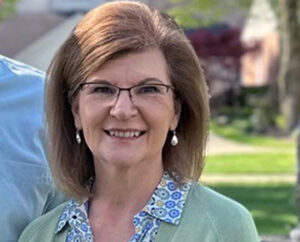 By Dawn Brandt, Compliance Coordinator
By Dawn Brandt, Compliance Coordinator
But we see him who for a little while was made lower than the angels, namely Jesus, crowned with glory and honor because of the suffering of death, so that by the grace of God he might taste death for everyone.—Hebrews 2:9, ESV
It had been a while since I’d held a newborn, but holding a friend’s days-old son brought back the awareness of how much protection an infant needs. By God’s design, even before a child is born, the instinct to shield and shelter is “born” in a parent-to-be. In some ways, that instinct barely diminishes as the child becomes independent. An injustice done to our child, at whatever age, arouses the impulse to protect, to defend, to make his pain go away.
As our children grow, we must gradually release them from our protection. But as a human parent, I could not willingly offer my child to be brutalized unjustly, even for another’s good. I could not choose this way of saving someone. I could not plan this for my child. I could not bear this. Who could? Only Father God.
And He did. He chose, planned, bore and suffered the unspeakable, and that is what allows us to be His and grants us a glimpse of His glory. God the Father’s pain is the dark backdrop to the “good news of great joy” (Luke 2:10). The fact that Christmas is beautiful even in its anticipation of Christ’s suffering reveals the majesty of the Father’s sacrificial grace.
This Christmas season, consider Jesus, the Father’s precious gift of love and life, sacrificed for us, displaying God’s glory. And consider the Father, doing the impossible: choosing, planning and bearing what was required to save us and, in so doing, revealing His glory.
And if you have the chance, hold a newborn and be reminded of the Father’s precious Son, sharing in His suffering and in His glory.
PRAY & REFLECT: “Dear Father, thank you for your precious gift of love and life, sacrificed for us. Thank you for the beauty of Christmas as a time to recall the cost of our salvation. Amen.”
Dec. 17 | Courage to Intervene
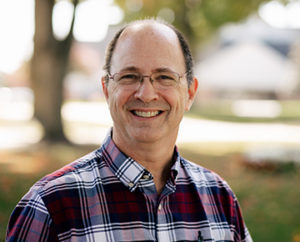 By Dr. Bob Dodson, Education Professor & Field Placement Coordinator
By Dr. Bob Dodson, Education Professor & Field Placement Coordinator
Have I not commanded you? Be strong and courageous. Do not be frightened, and do not be dismayed, for the Lord your God is with you wherever you go.—Joshua 1:9, ESV
In the centuries before Jesus was born, pagans would celebrate the winter solstice as a time to honor the coming of the light. During Advent, we celebrate the coming of Jesus, the coming of the Light of the world (John 8:12). As the Light, Jesus came to intervene in the darkness—to change the course of humanity as they knew it. No doubt He did this in love, but Jesus called people to courageously follow Him, no matter how light or dark the path appeared.
This last part seems to scare people. For many of us, it’s hard to talk with people in our sphere of influence about the gospel. We become timid and don’t initiate or follow through despite knowing Jesus is with us and calls us to be courageous. I’m assuming I’m not the only one to admit that it is hard to be the Light of Jesus to our neighbors, co-workers, friends and family.
Proclaiming Jesus takes us out of our comfort zone, but perhaps it shouldn’t. John tells us that Jesus is the only one who can move us from dark to light (John 1:9-13). With this in mind, can we not simply be His instrument? If we truly allow Jesus to live through us and allow His strength to take over, to let us be His instrument, then perhaps, just perhaps, this can take away the fear factor. This is a constant decision each of us has to grapple with every day.
I am reminded of a quote from Winston Churchill: “Fear is a reaction. Courage is a decision.” To fear is to succumb, to be courageous is to take a stand. If Jesus came to walk this Earth and intervene through the darkness, then perhaps we can take a nod from Churchill and choose courage rather than fear—courage to minister to others, serve them, love them, to be Jesus to them. And by God’s grace, He will allow us to be an instrument of change in the course of their lives. He has called for us to courageously intervene through the darkness.
It’s wonderful to celebrate Jesus’s coming during the season of Advent. However, I dare us to take celebration to the next level, to follow Jesus’ leading in courageously intervening by bringing light to the darkness. Who in your sphere of influence needs to know the Light of the World?
Go and intervene in Jesus’s name.
PRAY & REFLECT: “Lord, please forgive my fear and hesitancies. Fill me with gratitude for my salvation that fuels the boldness to share so others will know the Savior who came at Christmas. In His precious name, Amen.”
Dec. 18 | O Come Let Us Adore Him
 By Dr. Tanya Solomon, Site Director, Philadelphia
By Dr. Tanya Solomon, Site Director, Philadelphia
Shout joyful praises to God, all the earth! Sing about the glory of His name! Tell the world how glorious He is.—Psalm 66:1–2, NLT
Advent is the season of preparation for the coming of Our Savior, Jesus. When I was young and not yet saved, one of my favorite Christmas carols was the song, “O Come All Ye Faithful.” I especially loved the refrain: “O come let us adore Him, O come let us adore Him, O come let us adore Him, Christ the Lord!”
For years, hearing this tune would take me back to the grand Christmases my parents provided for my sisters and me. In preparation for Christmas, we would go shopping and help my parents clean, decorate our house and bake treats. Carols like this one, sung by artists such as Nat King Cole and The Jackson Five, would be playing on the record player. These songs set the “Christmas spirit” into full swing for my family.
As an adult and born-again believer, I encountered this song at a church where my husband and I fellowshipped. Our pastor broke into an impromptu song before preaching. He began to repeatedly sing the part of the song I love so much, “O come let us adore Him.” He then added lyrics, such as: “For He alone is worthy, for He alone is worthy, for He alone is worthy, Christ the Lord!” Eventually, every person in the large sanctuary was singing. It was one of the most powerful worship experiences I had ever witnessed because it focused on who Jesus is.
At that moment, I realized that while the Christmases of my childhood were rich and special family times, they were missing a key element: Jesus! Unfortunately, this is often what happens today. We get caught up in gift-giving and other distractions at Christmas. We should let this song be a timeless reminder of the purpose of Advent for believers—to tell the world about our glorious Savior!
PRAY & REFLECT: “Dear Lord, we come to you in humble gratitude, giving you honor and praise for your loving plan of redemption and restoration. We deem it a privilege to glorify your holy name and to tell others of our Lord Jesus’ living example, redeeming death and sovereign resurrection. Oh, how we love you! Thank you for your saving grace that allows us to go from distracted prodigals to redeemed, growing sons and daughters! Amen.”
Dec. 19 | Small and Secret
 By Shanika Churchville, MSEd, Director of the Ally Center
By Shanika Churchville, MSEd, Director of the Ally Center
So we do not lose heart. Though our outer self is wasting away, our inner self is being renewed day by day.—2 Corinthians 4:16, ESV
I spend much of my days with students in the process of writing. They often find it slow, tedious, not immediately gratifying. They want to produce pages and papers and often have to settle for word by word. I try to offer words of comfort: “Writing is a spiritual discipline. When you write, you not only engage in a humbling discipline of details, you imitate the slow, secret, consistent work God does every day.” They aren’t always convinced.
Being immersed in writing has given me a great context in which to ponder the slow, incremental way in which God often works. He did not send His Son to us fully grown, in a blaze of glory. Rather, He planted the salvation of the world in Mary’s womb to develop cell by cell. Our Messiah grew inch by inch. Picture him over the years—He grew taller, his voice deepened, he outgrew his sandals. God committed Himself to the unhurried and unglamorous process of developing the Light of the world from embryo to fully man.
The Bible is full of analogies comparing the spiritual life to the slow, hidden and laborious. Consider its many plant metaphors: the seed dies in the secrecy of the soil to raise new life (John 12:24); the tree reaches its long roots deep to meet water (Psalm 1:3); the tiny, unassuming mustard seed eventually bursts into a large and glorious tree (Mark 4:30–32).
At this time of year, on the cusp of the old, leaning into the new, we often yearn for sudden and dramatic transformation—pounds lost, miles run, unruly children miraculously transformed. Of course, we serve a God of miracles, a God who transforms. Yet so much of what God does is hidden, tiny, daily and in secret. The God of the universe is also, to borrow the words of novelist Arundhati Roy, the “God of small things.” As we celebrate God’s faithfulness in the big things, let us also praise Him for the slow and daily renewal he works in our hearts, in secret, with great grace and love.
PRAY & REFLECT: “Oh, Heavenly Father, your wisdom in sending your Son to grow and develop is overwhelming. Forgive us for wanting results to occur quickly and without a process. Show me the small steps to walk slowly as I grow in my life with you. Help me to find your steps to be the best ones for me. Amen.”
Dec. 20 | Peace on Earth
 By Dr. Esther Zimmerman (’19), Program Chair of Undergraduate Ministry Studies; Children & Family Ministry Program Director
By Dr. Esther Zimmerman (’19), Program Chair of Undergraduate Ministry Studies; Children & Family Ministry Program Director
And he who was seated on the throne said, ‘Behold, I am making all things new.’ Also he said, ‘Write this down, for these words are trustworthy and true.’ And he said to me, ‘It is done! I am the Alpha and the Omega, the beginning and the end. To the thirsty I will give from the spring of the water of life without payment.’—Revelation 21:5–6, ESV
For several weeks each year, the media churns out songs, films, pictures and dreams of an “ideal Christmas” where everyone is happy, every wish is granted, and anything is possible. For some, it’s a lot of fun. For others, it’s a cruel reminder that all is not well in their worlds.
Henry Longfellow felt this tension keenly during America’s Civil War as he wrote the following words:
‘There is no peace on earth,’ I said; for hate is strong, and mocks the song of peace on earth, good-will to men!
I heard this carol sung for the first time just a few days after returning home from a war-torn region of the Democratic Republic of the Congo. The words resonated deeply as I sat in church surrounded by Christmas sweaters, decorations and happy smiles. My time with Christians who were suffering intensely had shaken me to my core. However, Longfellow’s next words were a powerful defense of Christmas:
Then pealed the bells more loud and deep: God is not dead, nor doth He sleep; The Wrong shall fail, the Right prevail with peace on earth, good-will to men.
As believers in Jesus Christ, there is a depth to our Christmas celebrations that the world cannot hope to imitate. The world is NOT the way it is supposed to be—that’s why there is Christmas. In the incarnation, God Himself entered our broken world as a human baby—to redeem, restore and reconcile all things to Himself, to proclaim a true and lasting peace on earth that will someday be fully realized.
The trappings of Christmas can be a lot of fun, but the true joy of Christmas is found in Jesus, our hope of redemption.
PRAY & REFLECT: “Lord Jesus, we acknowledge that you are the redeemer of this world, this world that so desperately needs you. It is your peace that passes all understanding and can override the tumult that humans sometimes experience. We offer praise and celebration for this redemption. Amen.”
Dec. 21 | The Son of the Invisible God
 By Dr. E. Penny Clawson, Professor Emeritus
By Dr. E. Penny Clawson, Professor Emeritus
In the days of his flesh, Jesus offered up prayers and supplications, with loud cries and tears, to him who was able to save him from death, and he was heard because of his reverence. Although he was a son, he learned obedience through what he suffered. And being made perfect, he became the source of eternal salvation to all who obey him.—Hebrews 5:7–9, ESV
The season of Advent and Christmas is a perfect time to reflect on the incarnation of Jesus, the unique act of God becoming man, human, a baby. What a mystery this is when we consider that an omnipotent God relinquished the power of being God to become helpless, needing to grow and be taken care of, dependent on others. He left the relationship with His Heavenly Father to have a relationship with His earthly father, Joseph. He went from never needing anything such as food, water, shelter, rest or clothing to become a man needing all of those, and eventually being denied these at times in His life. What a contrast!
The author of Hebrews adds to this conundrum in Chapter 5, while Paul declares the deity of the Incarnated Christ this way:
The Son is the image of the invisible God, the firstborn over all creation. For in him all things were created: things in heaven and on earth, visible and invisible, whether thrones or powers or rulers or authorities; all things have been created through him and for him. He is before all things, and in him all things hold together.—Colossians 1:15-17, ESV
God, made flesh, to become the sacrifice for our sins, the sacrifice that was once for all, never needing to be offered again! When we sing from a cradle to a cross, do we fully understand the depth of these words? Have you and I considered the life Jesus lived on this earth anticipating that day of ultimate sacrifice?
PRAY & REFLECT: “Heavenly Father, we confess we do not understand the relationship of you with your Son, but we are so very grateful for the very act of His incarnation. Without His perfect life on Earth, His perfect sacrifice on the cross, there would be no salvation. We are humbled to be counted among those whose sins have been atoned. With deep gratitude, we say, Amen.”
Week 4 | December 22-28
Dec. 22 | A Redeemer from the Most Unlikely of Places
 By Dr. Michael J. Freeman, Professor & Communication Program Director
By Dr. Michael J. Freeman, Professor & Communication Program Director
Now these are the generations of Perez: Perez fathered Hezron, Hezron fathered Ram, Ram fathered Amminadab, Amminadab fathered Nahshon, Nahshon fathered Salmon, Salmon fathered Boaz, Boaz fathered Obed, Obed fathered Jesse, and Jesse fathered David.—Ruth 4:18-22, ESV
If you haven’t read the biblical book of Ruth in a while, I would encourage you to set this devotional aside for the 15 minutes it takes to read its four chapters and reacquaint yourself with this story. It will be time well spent.
It is set in the rebellious time of the Judges, where “everyone did what was right in their own eyes” (Judges 21:25). Sound familiar? Ruth is a story of deep loss, deep love, deep humility and deep faith.
At the end of Chapter 3. Ruth has already asked Boaz to be her redeemer—an honor she has every right to claim. Now, with this request made, she goes home to wait. Boaz has promised to return. She knows his character and trusts that he will do what he promises. Her fate is entirely in his hands.
However, her waiting was not in vain. Through Ruth, God hints at the larger plan of redemption He has in store. God takes this gentile woman, weds her to the son of a Canaanite prostitute and draws them into the family line of both King David and of Christ Himself (Matthew 1:5).
God seems to have always intended redemption to extend beyond the borders of the Jewish people. What good news for those of us now grafted into His family.
We are Ruth, the Church is Ruth, waiting for our Redeemer to return to claim us as His own. Like the citizens of Bethlehem, this world too is watching us while we wait. How we act during this time of waiting says as much about our faith in our Redeemer and our belief about His trustworthiness as it does about our own character.
Our Redeemer can be trusted; His word is law. God has provided a way to redeem our lives and add them to His story. We, too, can point to a redeemer from the most unlikely of places. Our testimony is how we wait for His return.
PRAY & REFLECT: “Lord, our redemption came through a line of generations planned by you, and my redemption is part of that plan. Thank you for that plan and provision. Forgive my heart of ingratitude and apathy. Draw me to my Savior in new ways during this Advent season so I might worship you with new vigor. Amen.”
Dec. 23 | ‘In the Beginning Was the Word…’
 By Dr. Gordon Gregory (’82), Professor of Bible & Theology, Faculty Athletic Representative
By Dr. Gordon Gregory (’82), Professor of Bible & Theology, Faculty Athletic Representative
In the beginning was the Word, and the Word was with God, and the Word was God.—John 1:1, ESV
The opening of John 1 would have spoken to a broad audience. For the Jews, John’s opening words would take them back to Genesis 1, where God creates through speaking. For the Greeks, those same words would cause them to think of the divine logos: the mind or thoughts of the gods. John would have had both groups hooked.
But for both groups, there was an unexpected twist in John’s introduction. For the Jews, this comes in Verse 1, where the Word is differentiated from God yet seen as equal to God. This would have offended their monotheistic sensibilities. Then in Verse 14, the idea that God became human would also cause them to cry, “blasphemy!” For the Greeks, Verse 14 would have also caused major problems. Greek philosophy saw the body as the prison house for the soul, and they were seeking escape from the body.
For the Jews, the incarnation is blasphemy; for the Greeks it is foolishness. But for the Christian, whether Jew or Greek, it is the greatest means by which we can know God (Verses 14, 18) and the means by which Jesus can take the sins of the world upon Himself. Both of these are true because Jesus is fully God. Christ being fully human also makes it possible for Him to be our representative and substitute to secure our salvation through His death and resurrection.
Down through history, the incarnation has been misunderstood, misrepresented and mocked, but it stands at the center of the Christian faith. It is one of the doctrines that makes Christianity unique among the world’s religions. Let us celebrate this core doctrine as we remember God the Son taking on our humanity!
PRAY & REFLECT: “Almighty Lord, your incarnation is the unique characteristic that distinguishes you to the world. We are so grateful for this selfless act that brought you to Earth as our Savior. We praise you and honor you for this very act that allowed you to suffer for our sake. Amen.”
Dec. 24 | A Time of Uncertainty
 By Amanda Zuschmidt (’03), MEd, Program Director for Sport Management
By Amanda Zuschmidt (’03), MEd, Program Director for Sport Management
Trust in the Lord with all your heart, and do not lean on your own understanding. In all your ways acknowledge Him, and He will make straight your paths.—Proverbs 3:5-6, ESV
During this Advent season, I am reminded of when I was pregnant with my son, Owen, 15 years ago in December 2009. On a routine prenatal check-up, I was rushed to the hospital, where I was told I had preeclampsia at only 24 weeks and that they would do everything possible to keep my growing baby inside as long as possible.
Days later, after being under heavy medication that was not working, I remember the team of high-risk OBGYNs running me down to surgery. All I could think about was Proverbs 3:5–6. I often wonder if the feelings I felt those days leading up to the birth of my son and afterwards were like those of Mary, the mother of Jesus. She was a virgin giving birth to a baby who was to be the Son of the Living God. She had little to no idea of what was to come: if Joseph would stay with her, how her family would react and the reaction of those who knew she was not yet married.
I imagine her fear was very real, as was mine 15 years ago. I am certain that God gave Mary the same strength to overcome her fear that he gave me on January 3, 2010, when my son was born weighing only 14 ounces and measuring 10 inches long. That foundational verse in Proverbs is forever marked on my mind when I think back to that night of great uncertainty and distress. I am so grateful for the truth and comfort of God’s Word in our time of need. In this season of Advent, may you be comforted by the peace and love of our Heavenly Father.
PRAY & REFLECT: “Dearest Father, you are a trustworthy God and a loving Father. That combination causes me to offer worship mixed with gratitude for who you are and the salvation you offered through your own Son. My heart is overcome with love and thanksgiving. Amen.”
Dec. 25 | Prince of Peace
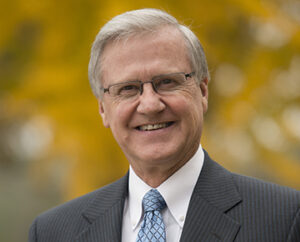 By Dr. Peter W. Teague, President Emeritus
By Dr. Peter W. Teague, President Emeritus
Peace I leave with you; my peace I give to you. Not as the world gives do I give to you. Let not your hearts be troubled, neither let them be afraid.—John 14:27, ESV
For my wife, Paulette, and me, Christmas never gets old! Although we have scaled back our seasonal activities, Christmas shopping and decorations, we never tire of entering this season with joyful anticipation, once again marveling at the incredible miracle of Immanuel, the God who is with us.
Even this most wonderful time of year comes in the course of difficult and challenging times. Wars, natural disasters, illness, loss, brokenness within families and a growing hatred among nations do not take a holiday. When I think of our times against the backdrop of the words of Jesus in John 14:27, I wonder how we can possibly find peace amid these tumultuous days?
Seven-hundred years before Jesus was born, the prophet Isaiah recorded God’s promise to send a deliverer, the Savior of the world who would meet our deepest needs. He is the Wonderful Counselor, who by His word helps us navigate the confusion of our day and find our way. He is the Almighty God, who by His great power spoke our universe into existence and rules over it today. He is our Everlasting Father, one with God who has no beginning and no end. He is the Prince of Peace, who brings order to chaos now and forevermore.
Jesus continued in John 14:27, “Let not your hearts be troubled, neither let them be afraid.” As you read and meditate on these truths, give Jesus your fears, chaos and dashed dreams; you will find Him faithful. Only in releasing our grip on our existence, which we cannot control anyway, can we find promised rest in the Prince of Peace.
PRAY & REFLECT: “On this most blessed day, Father in Heaven, we confess our fears for our families and our future. Help us to release our fears, our grip and our control, allowing you to bless this day, our tomorrows and our years.”
Dec. 26 | Past, Present and Future
 By Dr. Paul Thorlakson, Professor, Music, Worship & Performing Arts Department
By Dr. Paul Thorlakson, Professor, Music, Worship & Performing Arts Department
I tell you, among those born of women none is greater than John. Yet the one who is least in the kingdom of God is greater than he. (When all the people heard this, and the tax collectors too, they declared God just, having been baptized with the baptism of John, but the Pharisees and the lawyers rejected the purpose of God for themselves, not having been baptized by him.) To what then shall I compare the people of this generation, and what are they like? They are like children sitting in the marketplace and calling to one another, ‘We played the flute for you, and you did not dance; we sang a dirge, and you did not weep.’ For John the Baptist has come eating no bread and drinking no wine, and you say, ‘He has a demon.’ The Son of Man has come eating and drinking, and you say, ‘Look at him! A glutton and a drunkard, a friend of tax collectors and sinners!’ Yet wisdom is justified by all her children.—Luke 7:28-35, ESV
This season is a time to reflect backward as well as forward. We often focus on the prophecies, people and events that set the stage for the main event—when Christ broke through the heavens to bring redemption to this weary world. In Luke 7:28-35, Jesus is referring to the prophet, John the Baptist, and his divinely appointed role in preparing the way for his earthly ministry.
Throughout my life, I have become keenly aware of the way God has placed people in my path who have helped to prepare me. Many years ago, a persistent dark cloud seemed to intrude into every area of my world. It was debilitating. One Saturday morning, the oppressiveness of that cloud was especially intense and troubling. About 10 a.m., in a remarkably miraculously instantaneous way, that cloud seemed to pass, and the sun began to peek through. Two days later, I received an email from a friend, who I had not been in contact with for a long time. He wrote that God had laid it on his heart to pray for me on that same Saturday morning. I was absolutely stunned and grateful for my friend’s spiritual sensitivity.
As a person who has been called to ministry and academics, I am aware that I build on the legacy of other leaders who have preceded me. That inspires humility and gratitude, fully realizing that there are times when I have been able to reap what others have labored to sow. Furthermore, there is reassurance that the heavy slogging of my work, when results seem slow at coming, God could be using me to prepare the way for others. At the end of the day, God demands one thing—faithfulness, the ultimate legacy of Christ- centered leadership.
As I reflect on these two illustrations from my life, I am reminded of the need to recognize that we live and work within a continuum of the past, present and future. We can be thankful for all those who have prepared the way for us, and hopeful in the knowledge that we play a part in laying the groundwork for others. We will be able to do that if our hearts are open and sensitive like those who heard John’s call to repentance and were ready to follow Christ.
PRAY & REFLECT: “Gracious Father, thank you for those who have gone on before me, prepared the way for me and laid the path for my steps. Cause my own steps to be carefully laid for those who come behind me. Amen.”
Dec. 27 | Fragile Treasure
 By Ryan Geesaman, MS, Academic Dean of Arts & Sciences, Communication & Media Arts, Music Worship & Performing Arts
By Ryan Geesaman, MS, Academic Dean of Arts & Sciences, Communication & Media Arts, Music Worship & Performing Arts
But we have this treasure in jars of clay to show that this all-surpassing power is from God and not from us.—2 Corinthians 4:7, NIV
I find this verse from Paul comforting. It’s comforting to know that God has placed a treasure inside me. It’s comforting to know that I can’t take credit for that treasure. It’s clear that God understands that I am fragile, not unlike a vessel made of dirt. Some days I’m dirtier and more cracked than others, but I will remain fragile until God redeems this mortal body of mine. And that’s OK.
At the same time, this passage holds a certain weight of responsibility. I carry the treasure of the gospel, of knowing Christ and of the Holy Spirit. My fragility does not preclude me from this responsibility and privilege. In the same way a clay jar is meant to carry something and then pour it out, I am not meant to hold onto this treasure inside me. I’m meant to share it, and God is able to use my frailty to show the power in that treasure. Later in 2 Corinthians 12:9, Paul tells us that God’s “power works best in weakness.” We are instruments of that power so that God can be glorified, but it requires something of us—a willingness to be used.
As we reflect on Christmas and a new year, I am reminded of how Jesus showed us an example of this balance between fragility and power. He came to the Earth with the exterior of a vulnerable, human child, but He showed us what it looks like to carry the full power of God. As Christians, following His example, may the power and love of Christ pour out of us, His broken vessels.
PRAY & REFLECT: “Father, you are the potter, and I am but the clay, molded and shaped by you, and then chipped and sometimes broken. But regardless of the outside, the inside holds a precious treasure, your Spirit! May this Spirit abide deep within and flow out during this season when so many need to know the Christ of our redemption. Amen.”
Dec. 28 | The Yoking Mule
 By Dr. Sophia A. Ogunlana (’06), Master of Arts in Clinical Mental Health Counseling Program Director, Washington, D.C.
By Dr. Sophia A. Ogunlana (’06), Master of Arts in Clinical Mental Health Counseling Program Director, Washington, D.C.
Come to me, all who labor and are heavy laden, and I will give you rest. Take my yoke upon you, and learn from me, for I am gentle and lowly in heart, and you will find rest for your souls. For my yoke is easy, and my burden is light.—Matthew 11:28-30, ESV
One beautiful summer day, my family and I went on a farm tour in the Lancaster, Pa., area. An Amish family showed us their gardens, shared their culture and let our children feed their animals. As the mother brought us to the mules, she explained their training process. A yoke is tied around the neck of the younger mule and connected to the older mule. Thus, the younger mule is connected to the older mule throughout the day to observe and imitate the older mule. This shadowing continues for months until the two are synced. Our guide explained that consistently connecting the yoke between the two mules is key. The yoke must be strong to provide balance and support to bear the weight of what the mules transport.
Like the older mule, Jesus is always there to walk alongside us to carry our burdens. So many times, we try to be superheroes, barely juggling life responsibilities, leading to feeling burnt out, anxious and depressed. We often forfeit the Lord’s offer to take His yoke upon us and to learn from Him. He knows the daily struggles and gives us a safe place to rest.
PRAY & REFLECT: “Eternal Lord, thank you for your yoke and that you carry it with me. Forgive my independent efforts rather than allowing you to share the load. Show me again that you are ever-present in carrying my burdens. Amen.”
Conclusion | December 29-31
Dec. 29 | The Significance of the Incarnation
 By Dr. Joseph A. Kim, Professor of Bible & Theology
By Dr. Joseph A. Kim, Professor of Bible & Theology
Since therefore the children share in flesh and blood, he himself likewise partook of the same things, that through death he might destroy the one who has the power of death, that is, the devil, and deliver all those who through fear of death were subject to lifelong slavery. For surely it is not angels that he helps, but he helps the offspring of Abraham. Therefore, he had to be made like his brothers in every respect, so that he might become a merciful and faithful high priest in the service of God, to make propitiation for the sins of the people. For because he himself has suffered when tempted, he is able to help those who are being tempted.—Hebrews 2:14–18, ESV
It is no surprise that popular images of Jesus fail to portray Him accurately. Still, constant exposure to such images—of a peaceful baby radiating a warm, yellow glow; of a Jesus with an other-worldly look in His eyes; of a Jesus who doesn’t quite let His feet get dirty in the Galilean soil—can leave us with the impression that He wasn’t really one of us. Even Christians can find themselves misled into thinking that somehow Jesus wasn’t quite fully human.
The author of Hebrews explains the significance Jesus’ full humanity. Jesus took on human nature in all its fullness: He was “made like his brothers in every respect, so that he might become a merciful and faithful high priest in the service of God, to make propitiation for the sins of the people” (2:17). In the incarnation, Jesus willingly opened Himself up to all the experiences of humans in the fallen world, everything from getting splinters in His fingers and catching a stomach flu all the way to suffering betrayal, torture and death. Were it not so, He could not be our Savior. As Gregory of Nazianzus wrote long ago, “whatever he has not assumed, he has not healed.” In other words, if he wasn’t fully one of us, then we aren’t fully redeemed.
Spend some time this season thanking and praising the Lord for his great grace and mercy, that “for us and for our salvation … he became incarnate … and was made man.”
PRAY & REFLECT: “Oh Lord, my heart is humbled by the thought of your incarnation, the sacrifice of becoming human to suffer and die for me. Forgive me for my complacency in recalling this fact, and renew in me a heart of gratitude for your gift. Amen.”
Dec. 30 | Comfort for Clock-Watchers
 By Dr. Sam Harbin, Program Chair for Seminary Masters Programs
By Dr. Sam Harbin, Program Chair for Seminary Masters Programs
Beyond all question,
the mystery from which true godliness springs is great:
He appeared in the flesh,
was vindicated by the Spirit,
was seen by angels,
was preached among the nations,
was believed on in the world,
was taken up in glory.
—1 Timothy 3:16, NIV
For many of us as children, time marched to a painfully slow cadence as we impatiently awaited that last turn of the calendar to December 25. The joyful anticipation of everything that made Christmas magical for us appeared, mysteriously, to have an adverse effect on the clock.
For many during this season, time seems to drag on for a different reason. The culprit is not joyful anticipation of future comforts, but the painful remembrance of past comforts now lost. When you have experienced personal loss, those precious memories can become a source of pain—a poignant reminder of what you once enjoyed.
Whether you find yourself at this moment skipping through a season of blessing or enduring time’s slow march as you reflect on personal loss, 1 Timothy 3:16 speaks bright hope to us all. With six lines from an ancient Christian hymn, Paul reminds us that the “great mystery of godliness” for so long concealed has been in the person of Jesus Christ revealed. Through His incarnation, His earthly ministry and finished cross-work, and His victorious ascension to God’s right hand, Jesus has set in motion the restoration of God’s broken world. He is truly the One Who is making all things new.
Are you rejoicing today? Christ’s advent guarantees us far greater blessings yet to come. Do you grieve today? Christ’s advent assures that the tears of this life will soon be wiped away for all who know the Savior. And so we pray, “Thank you for coming, and, even so, come, Lord Jesus!”
PRAY & REFLECT: “Come, thou long expected Jesus, born to set your people free; from our fears and sins release us, let us find our rest in Thee. Amen.”
Dec. 31 | Thoughts from Many Hearts Will Be Revealed
 By Robert Blanks, MDiv, Program Director Master of Arts in Contextualized Pastoral Ministry, Uganda
By Robert Blanks, MDiv, Program Director Master of Arts in Contextualized Pastoral Ministry, Uganda
Baby Jesus, only 40 days old, entered the temple with his parents in fulfillment of the law. There they encountered Simeon who “was righteous and devout, waiting for the consolation of Israel.” Simeon, full of the Holy Spirit, picked up Jesus and pronounced a message of salvation for Gentiles and Jews alike.
Then Simeon addressing Mary specifically said:
‘Behold, this child is appointed for the fall and rising of many in Israel, and for a sign that is opposed (and a sword will pierce through your own soul also), so that thoughts from many hearts may be revealed.’ (Luke 2:34b-35, ESV)
This prophetic pronouncement reminds us, as we see confirmed throughout world history, that this little baby, the Messiah, will not simply arrive, live and die unnoticed. He will not passively move through life and fade into the background unseen. No, Simeon announces that this baby boy will shake up life and history as we know it. He will cause the fall and rising of many in Israel, and He will be opposed and face the opposition of many.
Today, even now at this moment, Jesus continues to reveal the thoughts of hearts. Our challenge is to slow down and listen to what He has to say. Simeon told Mary that it would be a painful road to salvation for her. The truth of Jesus is personal and piercing. Let us not refuse the Messiah and fall but respond in faith and rise.
What does Jesus reveal about your heart today?
PRAY & REFLECT: “Search me, O Lord Jesus, and know my heart. Try me and know my thoughts. And see if there be any grievous way in me, and lead me in the way everlasting” (adapted from Psalm 139:23-24). Amen.”
